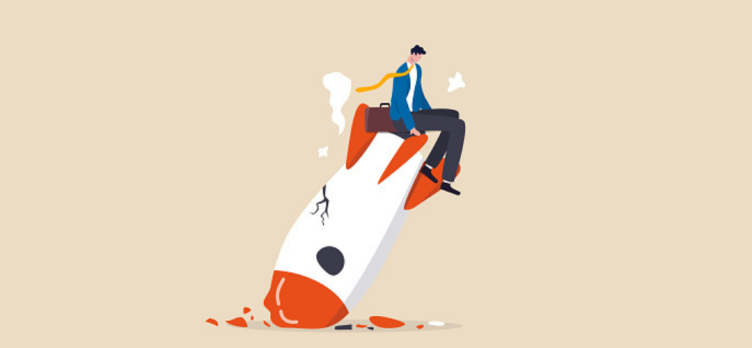May 26, 2023
The Crucial Interplay of Struggle and Failure in the Entrepreneurial Journey
Discover how failure and struggle shape the entrepreneurial journey. Explore startup survival rates and the resilience of entrepreneurs worldwide. Learn how failure drives adaptation and resilience, as seen in the transformative story of Slack.

As I've become more acquainted with failure and struggle over the last decade of my career, I've started to notice that these 'negative' experiences, while challenging at the moment, can also be viewed as harbingers of change or can even foreshadow future success if only we don't become discouraged but rather; learn, adapt and overcome.
In the world of startups, founders often find themselves navigating a landscape marked by challenges and hardships. While these instances of struggle and failure can be daunting and discomforting, they serve as the bedrock of the entrepreneur's path to success. Not only are these experiences instrumental in honing a founder's abilities and approach, but they also significantly contribute to the growth and eventual success of their business venture.
To comprehend the critical role of struggle and failure, it's necessary to delve into the data concerning the success and failure rates of startups. According to a comprehensive study by the Statistic Brain Research Institute in 2020, startups face a challenging survival rate: 25% of them fail within their first year, with the failure rate rising to 36% by the second year, and hitting 44% by the third year. Even with these seemingly discouraging figures, the realm of entrepreneurship continues to attract individuals worldwide. This resilience demonstrates the entrepreneurial understanding of struggle and failure as indispensable components of the journey to success.
The ethos of the startup culture has transformed the perception of failure from an impassable roadblock to an opportunity for reevaluation and redirection. Concepts such as "failing fast" or "failing forward" have gained substantial traction within the entrepreneurial community. The core of these philosophies lies in swiftly recognizing unsuccessful strategies and subsequently making adjustments or pivots informed by these realizations. Though this iterative process entails considerable struggle, it also uncovers critical insights that can fortify the business model, making it more adaptive and resilient.
Consider the story of Slack, the renowned workplace communication tool. This multi-billion-dollar company's origin is far from its current identity. It was initially a gaming company named Tiny Speck. When their gaming product struggled to gain market acceptance, the team demonstrated exceptional resilience. Instead of accepting defeat, they transformed the situation into an opportunity. They took the internal communication tool they had developed for their own use and turned it into what we now know as Slack, a platform revolutionizing workplace communication.
Struggle and failure also significantly influence a startup founder's personal and leadership development. Numerous research pieces underline that encountering failure can catalyze the growth of emotional intelligence and resilience. One such study published in the Journal of Small Business Management in 2017 found that entrepreneurs who had previously experienced failure exhibited enhanced resilience and a more innovation-oriented mindset compared to those who were new to the entrepreneurship scene. The past struggles and failures had armed them with a fortified mental strength and strategic acumen to navigate forthcoming challenges more effectively.
Moreover, the experiences of struggle and failure offer a unique lens through which decision-making skills can be refined. An intriguing report by the Harvard Business Review in 2011 discovered that entrepreneurs who had faced failure in their past were more likely to lean towards evidence-based decision-making strategies in their future ventures. Having borne the brunt of failure's consequences, these entrepreneurs cultivated a more analytical and meticulous approach to decision-making, thereby bolstering the success prospects of their future endeavors.
Furthermore, the acceptance of struggle and failure can stimulate an innovative and risk-taking culture within a startup. Unlike traditional corporations bound by rigid structures, startups possess the fluidity to experiment and innovate. These explorations might occasionally lead to failures, but they also hold the promise of leading to groundbreaking innovations capable of disrupting entire industries. To this effect, a 2019 research study by the Boston Consulting Group established that businesses cultivating a failure-tolerant culture reported a 45% higher likelihood of achieving breakthrough innovation.
In essence, the tribulations of struggle and failure are far from mere stumbling blocks in an entrepreneur's journey. They function as pivotal learning mechanisms, instigating a culture of innovation, catalyzing personal growth, and refining decision-making proficiencies.
